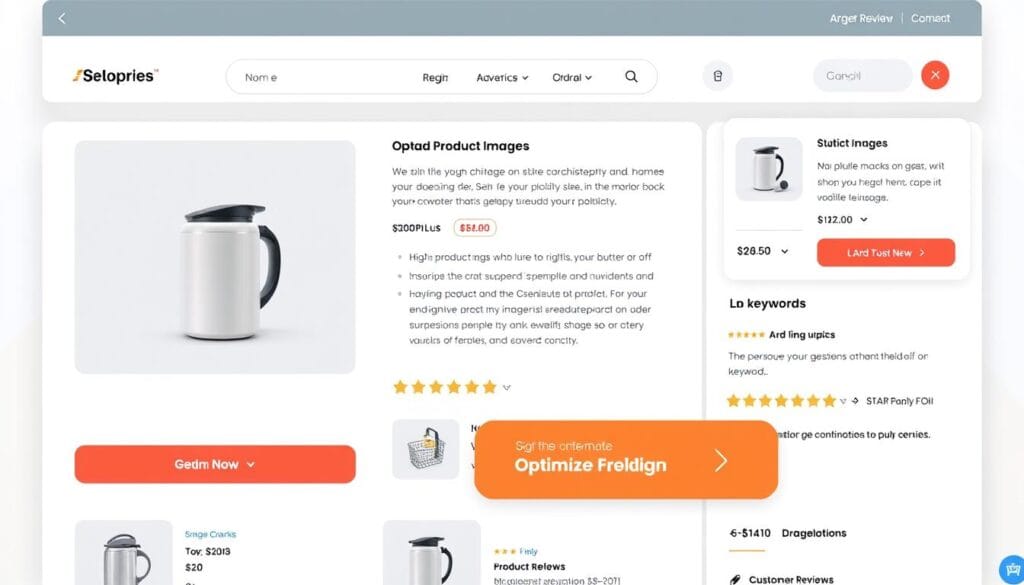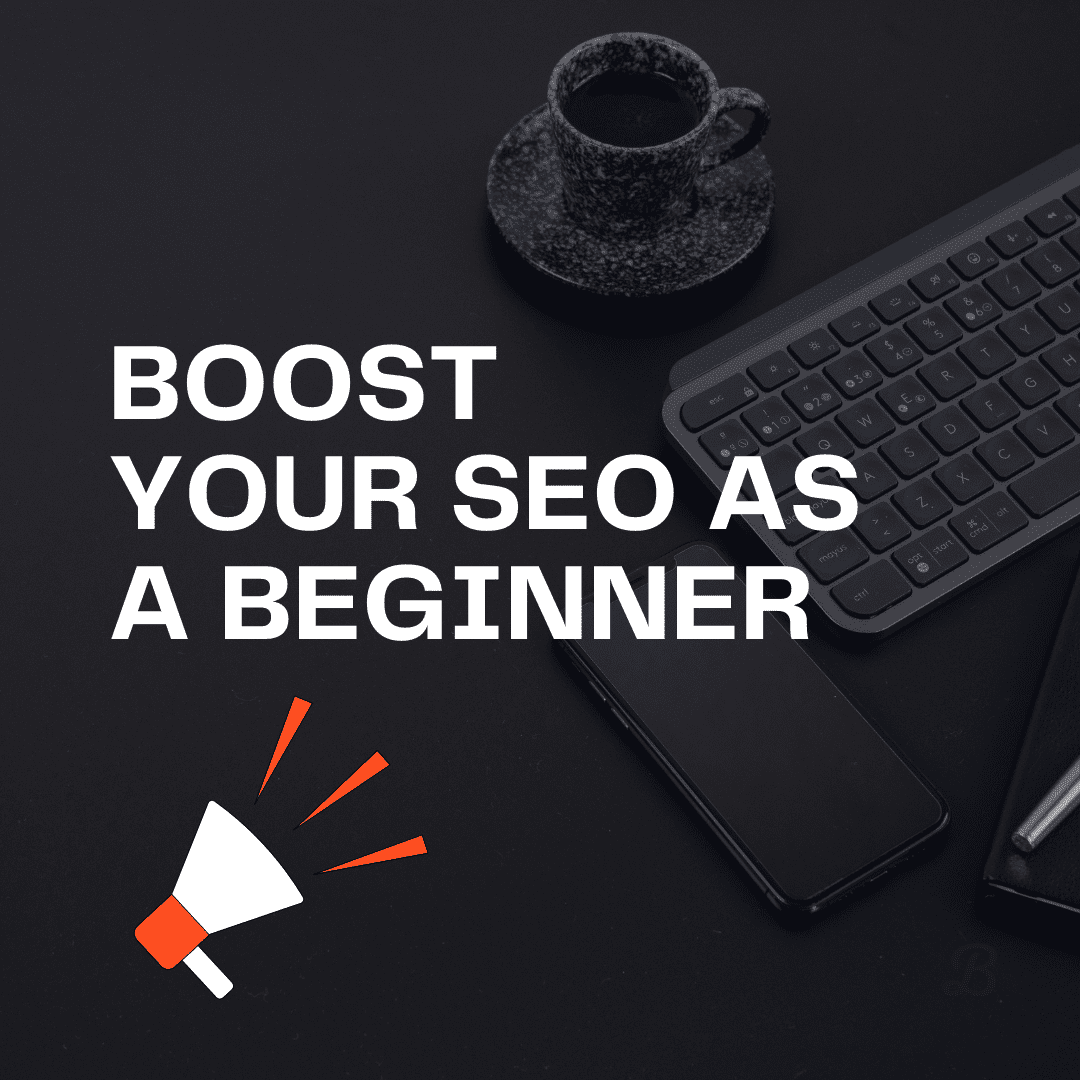In today’s digital world, just having an online store isn’t enough. Millions of people search for products online every day. How can you make sure they find yours? That’s where SEO for e-commerce comes in.
By optimizing your site for search engines, you increase visibility and drive more organic traffic. This can lead to more sales. Whether you’re starting out or want to improve your SEO, this guide will help. It covers everything you need to know to boost your online store’s search engine optimization.
Key Takeaways
- E-commerce SEO is essential for increasing online store visibility and driving organic traffic.
- Proper site optimization can lead to higher sales and a better return on investment.
- Understanding e-commerce SEO fundamentals is the first step to implementing effective strategies.
- Optimizing product pages, category pages, and site architecture are crucial elements of e-commerce SEO.
- Developing a content strategy and building quality backlinks can further enhance your online store’s search engine rankings.
Understanding E-commerce SEO Fundamentals
Optimizing your online store for search engines is key in today’s e-commerce world. To reach your website’s full potential, knowing the basics of e-commerce SEO is vital. By focusing on the main parts of optimizing your online store, you can improve your search engine ranking. This leads to more visitors who are likely to buy from you.
Key Components of Online Store Optimization
E-commerce SEO involves many strategies, like technical tweaks, creating great content, and building links. Making sure your site works well on mobile devices, loads quickly, and is easy for search engines to read is a good start. Writing engaging product descriptions, optimizing images, and using schema markup are also important steps to boost your online presence.
Why Search Engine Visibility Matters for Online Retailers
In today’s world, search engines are the main way people find and learn about products. When your e-commerce site ranks high in search results, it boosts your brand and attracts more visitors. This can lead to more sales, better conversion rates, and a higher return on investment for your business.
The ROI of E-commerce SEO
Investing in e-commerce SEO can bring big benefits to your online business over time. By optimizing your site and content, you can get more organic traffic, spend less on finding new customers, and keep your customers engaged. Plus, the effects of SEO can keep growing for years, making it a smart and affordable marketing choice for e-commerce sites.

Getting into e-commerce SEO is a key step for your online store’s success. By knowing the basics, seeing the value of being visible in search engines, and understanding the long-term benefits, you can grow your e-commerce business for years to come.
Essential Technical SEO Elements for Online Stores
Getting your e-commerce site to show up in search results is more than just good content. Technical SEO is key to a successful online store. We’ll look at the must-have technical elements to boost your e-commerce site’s search engine ranking.
Site Structure and URL Optimization
Your e-commerce site’s structure is vital for search visibility. Make sure it’s easy to navigate and has URLs that include your keywords. Also, avoid duplicate content and make sure each page has a unique URL.
XML Sitemaps and Robots.txt Configuration
An XML sitemap helps search engines find and index your site. Keep it updated and include all your site’s content. Also, use your robots.txt file to control which pages search engines can see.
| Technical SEO Element | Importance for E-commerce | Best Practices |
|---|---|---|
| Site Structure and URL Optimization | Enhances search engine discoverability and user navigation |
|
| XML Sitemaps | Helps search engines efficiently crawl and index website content |
|
| Robots.txt Configuration | Guides search engines on which pages to crawl and index |
|
By focusing on these technical SEO areas, you can make your e-commerce site more visible to search engines. This can lead to more traffic and sales.

Optimizing Product Pages for Maximum Visibility
In the fast-paced world of e-commerce, making sure your product pages are search engine-friendly is key. By using product page SEO, SEO for product descriptions, and other e-commerce SEO best practices, you can boost your online products’ visibility and findability.
Writing Compelling Product Descriptions
Your product description is a chance to tell and convince customers, while also pleasing search engines. Write descriptions that are both informative and engaging, with the right keywords. Stay away from boring or generic text. Instead, focus on what makes your products special and valuable.
Image Optimization Best Practices
- Use high-quality, visually appealing product images that showcase your offerings from multiple angles.
- Optimize image file names, alt text, and captions to include relevant keywords.
- Compress image files to ensure fast loading times, enhancing the user experience.
Product Schema Markup Implementation
Adding product schema markup to your product pages can greatly improve their search engine results. This structured data helps search engines understand your products better. This leads to more detailed and interesting listings.
“Optimizing your product pages is a critical component of a successful e-commerce SEO strategy. By focusing on compelling descriptions, visual optimization, and schema markup, you can increase the discoverability and appeal of your online offerings.”

Creating SEO-Friendly Category Pages
In the fast-paced world of e-commerce, making your product category pages SEO-friendly is key. These pages are the heart of your website, showing off your products and helping users find what they need. By using smart SEO tactics, you can boost your site’s ranking, make it easier for users to navigate, and increase sales.
Streamline Your Category Page Structure
The way you organize your category pages affects their SEO. Make sure your categories are clear and easy to understand. Use titles that accurately describe what’s inside. Also, make your navigation simple so users can find what they’re looking for without hassle.
Optimize Category Page Content
Writing great content for your category pages is crucial. Use the right keywords in your title, meta tags, and text. Give detailed descriptions of your products, focusing on what makes them special and how they meet your audience’s needs.
Leverage Internal Linking
Good internal linking can make your category pages more valuable. Link related products and subcategories to create a smooth user experience. It also helps search engines understand your site better.
Implement Category Page Schema Markup
Schema markup gives search engines more info about your category pages. It can include things like product details, prices, and availability. This can make your listings stand out in search results and get more clicks.
| Best Practices for SEO-Friendly Category Pages | Benefits |
|---|---|
|
|
By focusing on these key areas, you can make your e-commerce site a success. Improve your site’s structure, create engaging content, and use schema markup to attract more visitors and boost sales.
Mobile Optimization Strategies for E-commerce Sites
In today’s world, making your e-commerce site mobile-friendly is key. It helps you rank well in search engines and boosts sales. By focusing on mobile, you can reach more people and make your online store more appealing.
Mobile-First Design Principles
Mobile-first design is the base of good mobile optimization. It makes sure your site works well on small screens and with touch. This way, you create a great experience for everyone, no matter their device.
Speed Optimization for Mobile Users
For mobile SEO for online stores, speed is everything. People want fast sites, or they’ll leave. Use tricks like image optimization and content delivery networks to make your site quick and smooth.
Mobile User Experience Enhancement
Improving the mobile experience is more than just tech. Make it easy to navigate and shop. Use mobile-first design to make your site user-friendly and fun to use.
“Optimizing your e-commerce website for mobile is not just a best practice – it’s a necessity in today’s digital landscape.”
Site Architecture and Internal Linking for Online Stores
As an e-commerce owner, your website’s structure and linking are key for search engine optimization. A well-designed e-commerce site structure and smart internal linking strategies can greatly improve your SEO-friendly navigation. This leads to better search engine visibility.
A well-organized site architecture is crucial for e-commerce SEO. It should be easy for users and search engines to navigate. A logical hierarchy and clear navigation enhance the user experience and show search engines your content’s value.
Optimizing Your Site Architecture
- Establish a clear, hierarchical structure with intuitive navigation menus
- Ensure seamless crawlability and indexability for search engine bots
- Create logical URL structures that reflect your site’s organization
- Optimize your site’s internal linking to guide users and search engines
Good internal linking strategies boost your e-commerce site’s SEO. By linking your pages smartly, you help search engines understand your content’s context. This also improves your visitors’ experience. Techniques include linking related products and using your site’s menu to highlight important pages.
“Proper site architecture and internal linking are the foundations of a successful e-commerce SEO strategy. By optimizing these elements, you can enhance your online store’s visibility and drive more qualified traffic to your products.”
By focusing on a good site structure and smart linking, you can greatly improve your e-commerce website’s SEO. This leads to more targeted traffic and higher online sales.
E-commerce SEO Content Strategy
In the fast-changing world of e-commerce, a strong content strategy is key. It helps online stores get seen more in search engines and draw in customers. A detailed e-commerce content marketing plan can boost traffic, engage people, and increase sales.
Blog Content Planning for Online Stores
Starting a well-thought-out blog is a great move for blog content for online stores. Posting regularly about trends, products, and tips makes your store a go-to source. Plan your blog posts to match what your audience wants to read, making sure they’re both useful and SEO-friendly.
Creating Buyer Guides and Resources
Offering helpful resources like buyer guides and educational content is a smart move. These help solve your customers’ problems, answer their questions, and guide them to buy. By making detailed guides and informative content, you show you know your stuff and gain trust.
Seasonal Content Optimization
Keeping up with seasonal trends and adjusting your content can really help your SEO. Find out when people are most likely to shop for what you sell and make content for those times. Use the right keywords and timely info to make your seasonal content stand out.
With a smart e-commerce content marketing plan, you can use SEO content strategy to get more traffic, engage your audience, and increase sales. Use blog content for online stores to lead your industry and attract new customers.
Link Building Strategies for E-commerce Websites
In the world of e-commerce SEO, link building is key. It helps your online store be seen more and be trusted more. By getting good backlinks, your site’s credibility and search rankings can go up. Here are some top link building strategies for e-commerce sites.
Using product reviews is a strong method. Ask happy customers to review your products on trusted sites. These reviews help build trust and can get you valuable backlinks.
Working with other brands or influencers is also smart. By making content together or doing giveaways, you reach more people. This can get you backlinks from important sites.
| Link Building Tactic | Potential Benefits |
|---|---|
| Leveraging Product Reviews |
|
| Influencer and Brand Collaborations |
|
| Broken Link Building |
|
Broken link building is also a good strategy. Find and fix dead links on sites related to yours. This can help you get good backlinks and improve your SEO.
Link building for e-commerce is a long-term effort. Use these strategies to get better at link building for e-commerce, backlink acquisition, and off-page SEO for online stores. This will help your e-commerce business grow and succeed.
Measuring and Tracking E-commerce SEO Success
To get the most out of your e-commerce SEO, you need to know your key performance indicators (KPIs) well. The right analytics tools are also essential. By watching these metrics closely, you can see how well your strategies are working. This helps you make smart choices to grow your business over time.
Key Performance Indicators (KPIs)
For e-commerce SEO, some important KPIs to track are:
- Organic traffic to your website
- Organic search rankings for your target keywords
- Conversion rates from organic search
- Revenue generated from organic search
- Bounce rate and time spent on site from organic visitors
Analytics Tools and Reporting
To track your e-commerce SEO success, you’ll need strong analytics tools. Google Analytics, Google Search Console, and SEO tools for e-commerce are great options. They give you detailed data on how your website is doing. This lets you keep an eye on your KPIs and create detailed reports.
Conversion Tracking Setup
Getting conversion tracking right is key to seeing how your SEO efforts are paying off. By setting up conversion tracking, you can see how many visitors do what you want them to, like buying something. This helps you figure out if your SEO is worth it.
By always checking your e-commerce SEO metrics, using the right tools, and improving your conversion tracking, you’re ready to measure your online store’s success. You’ll be able to make smart choices to help your business grow.
Common E-commerce SEO Mistakes to Avoid
As an e-commerce business owner, it’s vital to avoid common SEO mistakes. One big error is ignoring product page optimization. Not writing good product descriptions, optimizing images, or using schema markup can hurt your search rankings.
Another mistake is not focusing on mobile optimization. With more people shopping on mobile, making sure your site works well on phones is key. If it doesn’t, you might see more people leaving your site and fewer sales.
Many e-commerce sites also struggle with their site structure and internal links. If your categories and product pages are hard to find, search engines have a tough time indexing your site. Fixing these technical SEO issues is important for keeping a strong online presence.





